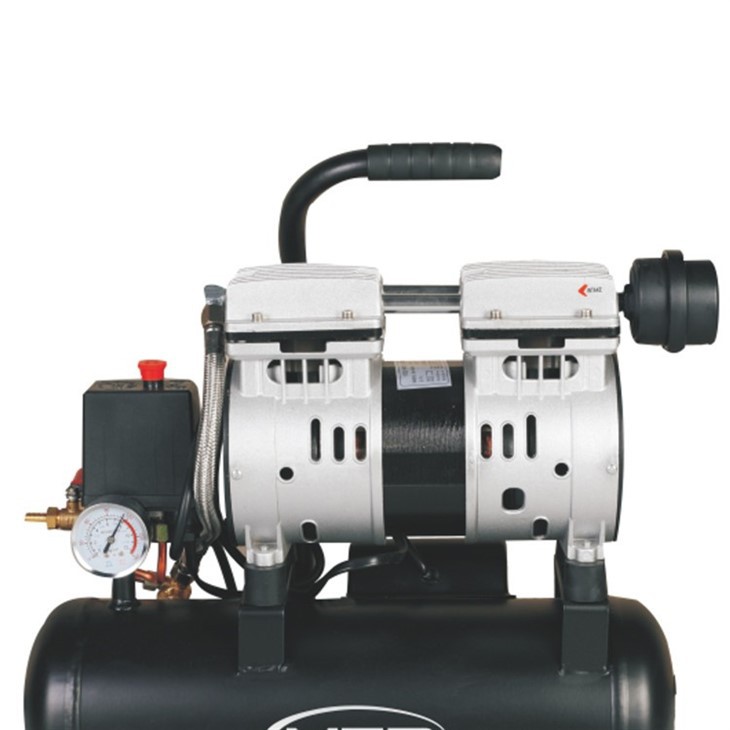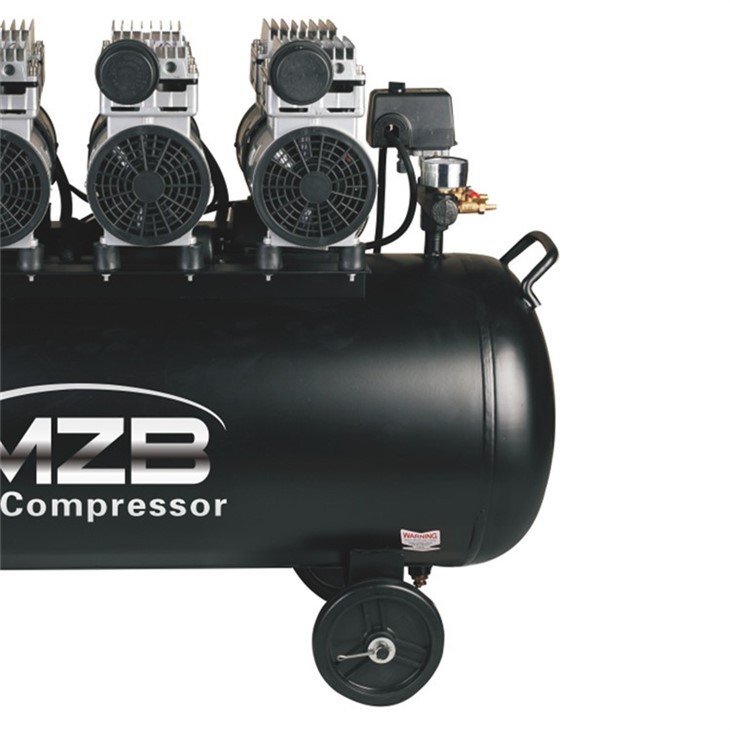When it comes to oil-free portable air compressors, one crucial concept that every user and potential buyer should understand is the duty cycle. As a reputable supplier of Oil Free Portable Air Compressors, I've seen firsthand how the duty cycle can significantly impact the performance and longevity of these machines. In this blog, I'll delve into what the duty cycle is, why it matters, and how it relates to our range of products, including the Double Tank 24 Liter Oil Free Air Compressor, Quiet Dental Air Compressor, and Medical Oil Free Air Compressor.
What is the Duty Cycle?
The duty cycle of an air compressor is defined as the percentage of time that the compressor can operate within a given time frame, usually a 10 - minute period. For example, if an air compressor has a duty cycle of 50%, it means that it can run continuously for 5 minutes out of every 10 - minute cycle and then needs to rest for the remaining 5 minutes. This rest period is essential because running the compressor for longer than its rated duty cycle can cause overheating, which may lead to premature wear and tear on the components, reduced efficiency, and even permanent damage to the machine.
The duty cycle is determined by several factors, including the design of the compressor, the quality of its components, and the type of motor used. Compressors with larger motors, better cooling systems, and high - quality components generally have higher duty cycles. For instance, industrial - grade oil - free portable air compressors often have higher duty cycles compared to consumer - grade models because they are built to handle more demanding applications.
Why Does the Duty Cycle Matter?
Understanding the duty cycle is crucial for several reasons. Firstly, it helps you choose the right air compressor for your specific needs. If you have a task that requires continuous or near - continuous operation, such as powering pneumatic tools in a busy workshop or running a dental clinic where air is constantly needed, you'll need an air compressor with a high duty cycle. On the other hand, if you only use the compressor occasionally for light tasks like inflating tires or powering small airbrushes, a compressor with a lower duty cycle may be sufficient.
Secondly, operating the compressor within its rated duty cycle ensures its longevity and reliability. Overworking the compressor by running it for longer than its duty cycle can cause the motor to overheat, which can lead to burned - out windings, damaged bearings, and other costly repairs. By respecting the duty cycle, you can extend the life of your air compressor and avoid unexpected breakdowns.
Duty Cycle and Our Oil - Free Portable Air Compressors
At our company, we offer a range of oil - free portable air compressors with different duty cycles to meet the diverse needs of our customers. Our Double Tank 24 Liter Oil Free Air Compressor is designed for medium - to heavy - duty applications. With a relatively high duty cycle, it can handle continuous use for short periods, making it ideal for small workshops or dental laboratories where a steady supply of compressed air is required.
The Quiet Dental Air Compressor is specifically engineered for dental applications. In a dental setting, the compressor needs to be quiet and reliable, and it often has to run for extended periods between patients. Our quiet dental air compressor has a duty cycle that is optimized for this type of use, ensuring that it can provide a consistent supply of clean, oil - free air without overheating.
Our Medical Oil Free Air Compressor is another product where the duty cycle is of utmost importance. In medical applications, the compressor must operate continuously and reliably to provide a safe and clean source of compressed air for various medical devices. Our medical oil - free air compressor is designed with a high - performance motor and an efficient cooling system, allowing it to achieve a high duty cycle and meet the stringent requirements of the medical industry.
How to Determine the Right Duty Cycle for Your Needs
To determine the right duty cycle for your application, you need to consider the following factors:


- Frequency of Use: If you plan to use the air compressor frequently throughout the day, you'll need a compressor with a high duty cycle. For example, if you're a professional mechanic who uses pneumatic tools all day long, a compressor with a duty cycle of 70% or higher would be ideal.
- Length of Use: Consider how long you'll need to run the compressor each time you use it. If you only need to run it for a few minutes at a time, a lower - duty - cycle compressor may be sufficient. However, if you have tasks that require continuous operation for 15 minutes or more, a high - duty - cycle compressor is necessary.
- Type of Application: Different applications have different air - demand requirements. For example, powering a large - scale sandblaster or a spray gun requires a continuous supply of high - volume air, which means you'll need a compressor with a high duty cycle. In contrast, inflating a bicycle tire or a small air mattress requires less air and can be done with a lower - duty - cycle compressor.
Maintaining Your Air Compressor to Optimize the Duty Cycle
To ensure that your air compressor operates at its rated duty cycle and lasts for a long time, proper maintenance is essential. Here are some maintenance tips:
- Regular Cleaning: Keep the compressor clean, especially the air intake and the cooling fins. A dirty air intake can restrict airflow, causing the compressor to overheat. Cleaning the cooling fins helps to dissipate heat more efficiently.
- Lubrication (if applicable): Although our oil - free air compressors do not require oil lubrication in the traditional sense, some components may still need occasional lubrication. Refer to the user manual for specific lubrication requirements.
- Check the Belts and Hoses: Inspect the belts and hoses regularly for signs of wear and tear. Replace any damaged belts or hoses immediately to prevent air leaks and ensure proper operation.
- Monitor the Temperature: Keep an eye on the temperature of the compressor during operation. If it starts to overheat, stop using it and let it cool down. Overheating can significantly reduce the duty cycle and damage the compressor.
Conclusion
The duty cycle is a critical factor to consider when choosing an oil - free portable air compressor. It determines the compressor's ability to operate continuously and affects its performance, reliability, and longevity. As a supplier of high - quality oil - free portable air compressors, we understand the importance of the duty cycle and have designed our products to meet the diverse needs of our customers. Whether you need a compressor for light - duty tasks or heavy - duty industrial applications, we have a solution for you.
If you're interested in learning more about our oil - free portable air compressors or have questions about the duty cycle, please feel free to contact us. Our team of experts is ready to assist you in selecting the right compressor for your specific needs and guide you through the purchasing process. Let's work together to find the perfect air compressor solution for your business.
References
- Compressed Air and Gas Institute (CAGI). Standards and guidelines for air compressor performance.
- Manufacturer's manuals for our Double Tank 24 Liter Oil Free Air Compressor, Quiet Dental Air Compressor, and Medical Oil Free Air Compressor.





